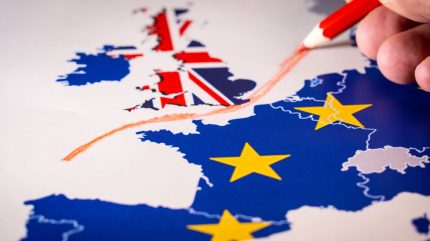
The UK’s food exports to the EU have fallen by £2.82bn ($3.57bn) annually since Brexit, according to the Centre of Inclusive Trade Policy (CITP).
Since the Brexit transition ended in January 2021, the UK’s agri-food exports to the EU have fallen by an average of 16.34% per year compared to the previous three-year period, the report said.

Discover B2B Marketing That Performs
Combine business intelligence and editorial excellence to reach engaged professionals across 36 leading media platforms.
While the decline coincided with the “significant geoeconomic impacts” of Covid-19 and Russia’s invasion of Ukraine, “trade flows between the UK and EU, particularly exports, demonstrate no recent signs of regaining previous levels”, the CITP said.
The decline in trade is attributed to increased input costs and new regulations around trade.
According to the study, UK farmers have expressed concerns about the negative impact of Brexit, with 70% of cereal growers, 68% of dairy, beef, and sheep producers, and 81% of vegetable growers citing adverse effects.
Industry organisations, meanwhile, highlighted that “certification” and the “regulatory measures” needed for UK-EU agri-food trade are “major obstacles” to sector growth and “significant” sources of added costs, the study added.

US Tariffs are shifting - will you react or anticipate?
Don’t let policy changes catch you off guard. Stay proactive with real-time data and expert analysis.
By GlobalDataBefore Brexit, regulatory harmonisation facilitated integrated supply chains within agri-food businesses.
Now classified as a ‘third country,’ the UK faces new regulatory barriers, including enhanced documentary requirements and physical inspections.
The UK government is aiming to pursue a Sanitary and Phytosanitary Standards (SPS) agreement with the EU to reduce checks.
A report from Aston University suggests such an agreement could boost UK agri-food exports to the EU by 22.5%.
The CITP report suggested the first step in talks between the UK and the EU could be “to take stock of the divergence that has taken place.”
It outlines three types of divergence: formal legislative, process (including regulatory formation, internal market, and enforcement), and strategic.
For instance, the EU has implemented stricter standards in areas such as pesticides and hazardous substances, while the UK has raised animal welfare standards.
The CITP called on the UK government to “consult with industry and devolved nations” on how such an agreement “fits with its wider agri-food strategy”.





